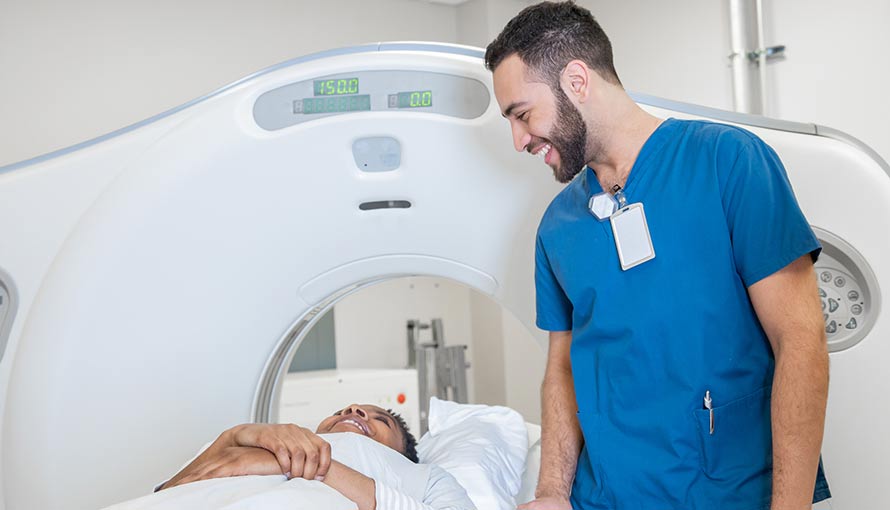Myeloid Sarcoma

A myeloid sarcoma is an uncommon type of soft tissue tumor made up of immature white blood cells (myeloid cells). Although classified as a blood cancer, myeloid sarcoma is unique in that it develops outside of the bone marrow, where myeloid cells originate. Instead, masses can form in the lymph nodes, skin, gastrointestinal tract, testes or other soft tissues throughout the body.
What are the signs of myeloid sarcoma?
Because myeloid sarcomas can form virtually anywhere in the body outside the bone marrow, the cancer can potentially affect many different organs and tissues. Therefore, the symptoms can vary widely depending on the size of the tumor, whether it is affecting nearby organs and tissues and, if so, which ones.
The nonspecific symptoms of myeloid sarcoma can include:
- Extreme fatigue
- Unintended weight loss
- Loss of appetite
- Pain
What causes myeloid sarcoma?
A myeloid sarcoma forms when myeloid cells undergo abnormal changes that cause them to grow and divide uncontrollably. Known as myeloblasts, the excess abnormal cells then build up, bind together and form a tumor. Researchers continue to investigate possible causes of the genetic mutation that leads to the development of myeloid sarcoma.
What are the risk factors for myeloid sarcoma?
Myeloid sarcomas can affect anyone, although this type of cancer is frequently diagnosed in people who have:
- Acute myeloid leukemia (AML)
- Chronic myeloid leukemia (CML)
- Myeloproliferative neoplasm
- Myelodysplastic syndrome
When AML is in remission, a myeloid sarcoma may be the first sign of a recurrence.
How is myeloid sarcoma diagnosed?
The diagnostic process for myeloid sarcoma typically begins with an imaging test—such as a computed tomography (CT) scan, a magnetic resonance imaging (MRI) scan, a positron emission tomography (PET) scan or an ultrasound—which can be used to rule out other, more common types of tumors.
The next step is usually a biopsy, which is the only way to confirm a diagnosis of myeloid sarcoma. A physician will remove a small sample of tumor tissue for examination by a pathologist, who can identify cancerous cells. Myeloid sarcoma often contains myeloperoxidase, an enzyme that makes the tumor cells appear green when viewed under a microscope.
Other tests that may be used to diagnose myeloid sarcoma include:
- Cytogenetic analysis – This test examines a cell sample for damaged chromosomes. A pathologist can identify myeloid sarcoma based on specific genetic abnormalities.
- Immunophenotyping – This test examines a cell sample for specific antigens, enzymes or proteins (markers) to determine the type of cancer.
What are the treatment options for myeloid sarcoma?
Treatment for myeloid sarcoma can vary based on various factors, including the location and size of the tumor, the genetic abnormalities in the chromosomes and the patient’s age and general health. Some options include:
- Chemotherapy – Generally the most effective treatment for myeloid sarcoma, most patients begin chemotherapy immediately after diagnosis. Powerful medications are infused into the bloodstream, then circulate throughout the body to target and destroy widespread cancer cells.
- Surgery – If a tumor can be surgically removed, surgery may be combined with chemotherapy.
- Radiation therapy – High-energy beams are aimed directly at the tumor to destroy cancerous cells. Like surgery, radiation may be combined with chemotherapy.
- Allogeneic hematopoietic stem cell transplantation – During remission and after chemotherapy, the patient may receive healthy stem cells from a donor, which can mature into healthy blood cells and replace the cancerous cells.
- Targeted therapy – Specialized drugs are designed to attack specific weaknesses in the cancer cells, which may destroy them or prevent them from multiplying.
Sarcoma treatment at Moffitt Cancer Center
Myeloid sarcoma is a fast-growing cancer that requires specialized and aggressive care. The best way to ensure an accurate diagnosis and appropriate treatment is to turn to a comprehensive cancer center.
Moffitt Cancer Center is a respected high-volume cancer center, and we are proud to have been designated a Comprehensive Cancer Center by the National Cancer Institute. The multispecialty team in our renowned Sarcoma Program sees many patients with all types of sarcomas, including myeloid sarcoma. Through extensive research and clinical trials, we are urgently pushing for progress and always moving forward. We work with the intensity that is called for when it comes to our patients’ lives.
If you would like to learn more about myeloid sarcoma, contact Moffitt Cancer Center at 1-888-663-3488 or complete our new patient registration form online. You do not need a referral to request an appointment with an expert at Moffitt.
References
National Library of Medicine – Myeloid Sarcoma
